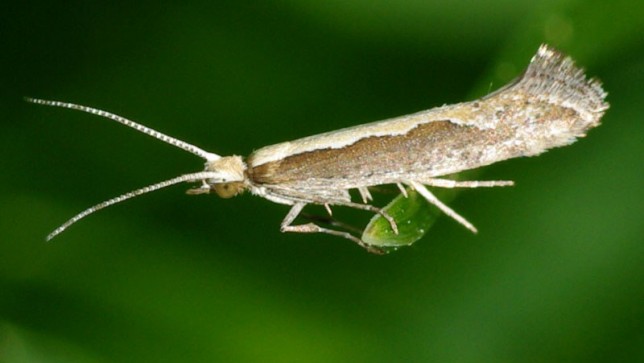U.S. advocacy groups Center for Food Safety, Food and Water Watch, and Friends of the Earth U.S., along with the Northeastern Organic Farming Association of New York, called for a halt Tuesday to open field trials of genetically engineered (GE) diamondback moths at Cornell University.

The initial trials have been in enclosed screened cages, but are expected to move to open trials early next spring.
The groups cite numerous unaccounted for risks, including impacts to non-target species, contamination of crops, and unknown evolutionary changes. The urgent call comes in advance of a multi-agency (USDA, EPA,FDA) public comment period on the coordinated framework for regulation of biotechnology, the three decade old executive branch policy document meant to help describe various agencies’ regulation of GE organisms. The UK-based group GeneWatch has also just released a report detailing concerns around the GE moth.
“This field trial is moving forward with little to no assessment of the real world risks it presents. Once these GE moths are out in the wild, there is no turning back. Every possible scenario needs to be accounted for. Until federal agencies have implemented rigorous regulations around GE insects, this GE moth trial should be halted,” said Jaydee Hanson, senior policy analyst at Center for Food Safety.
“NOFA-NY is seriously concerned about unintended impacts of the release of these insects on New York’s significant brassica industry, both conventional and organic. As leading producers of cabbage, broccoli, and cauliflower, New York farmers need to understand what will happen when [hundreds of] thousands of Diamondback moths are released weekly during these trials,” said Anne Ruflin, executive director for Northeast Organic Farming Association of New York.
“Introducing GE diamondback moths into U.S. agriculture could put the organic label at risk and undermine consumer trust and the livelihoods of organic farmers,” said Food & Water Watch executive director, Wenonah Hauter. “Unleashing millions of barely tested moths into New York without sufficient controls is an unnecessary threat to farmers, health and the environment.”
“The USDA and Cornell University have moved forward with this trial despite numerous uncertainties in protocol and questions about safety,” said Dana Perls, food and technology policy campaigner at Friends of the Earth U.S. “There is no need to meddle with moths in New York when there are plenty of non-toxic and organic alternatives to manage these secondary pests.”
The mechanism for these GE moths to control population levels is for female offspring to die in the larval stage, and for males to continue to reproduce until there are no longer females in the population. The larval moths will die on plants, including crops such as broccoli and cabbage. In its assessment, the USDA failed to recognize that if farms near the field trial sites happen to be certified organic or non-GE, their markets could be lost if these larval stage GE moths were present because genetic engineering, even for pest control, is unacceptable.
Additional concerns around the release of GE moths in New York range; they include:
- Impacts on non-target species that might eat the larvae, including birds and other insects, as well as farmworkers and consumers that may come to ingest them through contact with crops;
- Development of antibiotic resistant bacteria in the environment and food chain resulting from the use of a tetracycline antibiotic to breed the GE moths;
- Economic and agronomic challenges, for both conventional and organic farmers, to grow certain crops due to large releases of the moth;
- The lack of appropriate bio-security measures to assure those who do not wish exposure to GE moths (farmers and consumers) are protected from contamination. Windblown moths can be dispersed hundreds/thousands of miles from where they emerge.
- The field trial may even involve the release of additional non-GE diamondback moths, the pest that the GE version is meant to control, as there may not be enough of the pests in New York State for the experiment to be performed. This could ultimately increase pest pressure for farmers.


















Irresponsibly S T U P I D
Stop this now. No GMGManything!!!! God help our country, this is sick